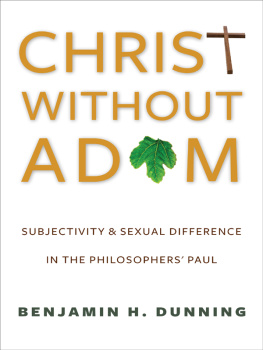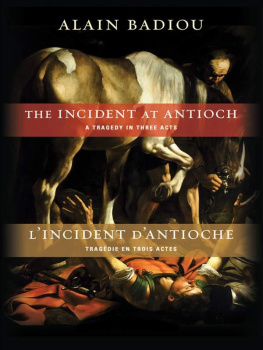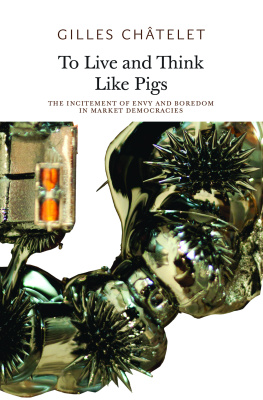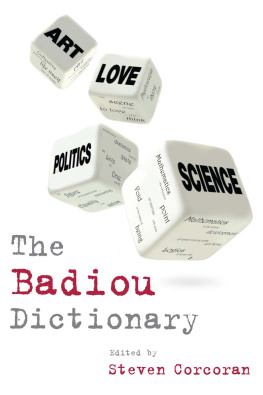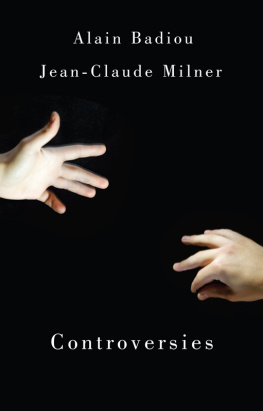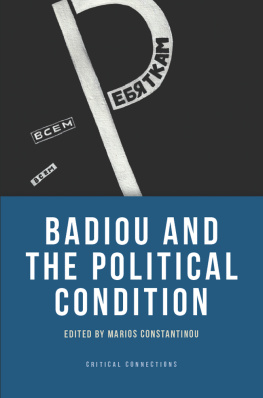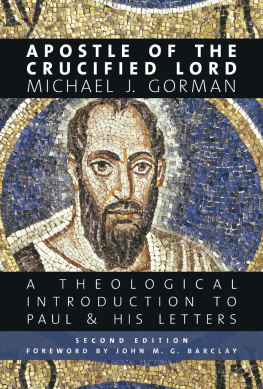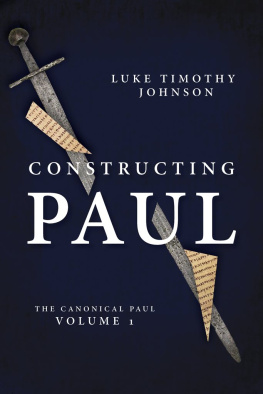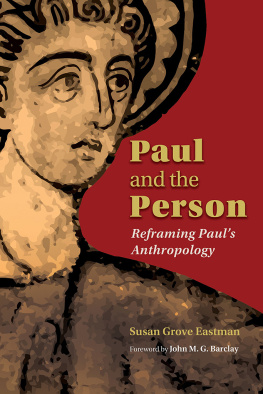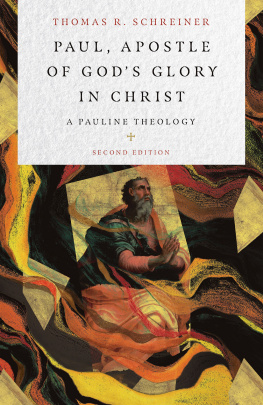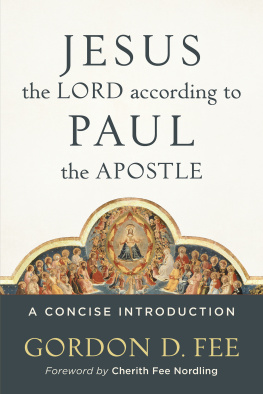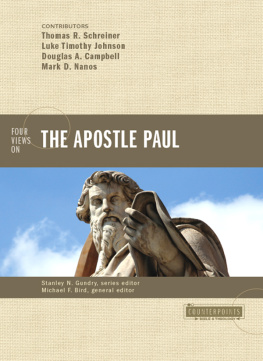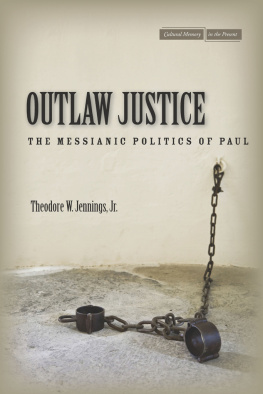CHRIST WITHOUT ADAM
Gender, Theory, and Religion
GENDER, THEORY, AND RELIGION
Amy Hollywood, Editor
The Gender, Theory, and Religion series provides a forum for interdisciplinary scholarship at the intersection of the study of gender, sexuality, and religion.
Martyrdom and Memory: Early Christian Culture Making,
Elizabeth A. Castelli
When Heroes Love: The Ambiguity of Eros in the Stories of Gilgamesh and David,
Susan Ackerman
Abandoned to Lust: Sexual Slander and Ancient Christianity,
Jennifer Wright Knust
Bodily Citations: Religion and Judith Butler,
Ellen T. Armour and Susan M. St. Ville, eds.
Naming the Witch: Magic, Ideology, and Stereotype in the Ancient World,
Kimberly B. Stratton
Dying to Be Men: Gender and Language in Early Christian Martyr Texts,
L. Stephanie Cobb
Tracing the Sign of the Cross: Sexuality, Mourning, and the Future of American Catholicisim,
Marian Ronan
Between a Man and a Woman? Why Conservatives Oppose Same-Sex Marriage,
Ludger H. Viefhues-Bailey
Promised Bodies: Time, Language, and Corporeality in Medieval Womens Mystical Texts,
Patricia Dailey
CHRIST WITHOUT ADAM
SUBJECTIVITY AND SEXUAL DIFFERENCE IN THE PHILOSOPHERS PAUL
Benjamin H. Dunning
COLUMBIA UNIVERSITY PRESS NEW YORK
Columbia University Press
Publishers Since 1893
NEW YORK CHICHESTER, WEST SUSSEX
cup.columbia.edu
Copyright 2014 Columbia University Press
All rights reserved
E-ISBN 978-0-231-53733-9
Library of Congress Cataloging-in-Publication Data
Dunning, Benjamin H.
Christ without Adam : subjectivity and sexual difference in the philosophers Paul / Benjamin H. Dunning
pages cm (Gender, theory, and religion)
Includes bibliographical references and index.
ISBN 978-0-231-16764-2 (cloth : alk. paper) ISBN 978-0-231-16765-9 (pbk. : alk. paper) ISBN 978-0-231-53733-9 (e-book)
1. Sex differencesReligious aspectsChristianity 2. Bible. Epistles of PaulTheology. 3. Breton, Stanislas. 4. Badiou, Alain. 5. iek, Slavoj. 6. Theological anthropologyChristianity. I. Title.
BS2655.S49D86 2014
227'.06dc23
2013035165
A Columbia University Press E-book.
CUP would be pleased to hear about your reading experience with this e-book at .
COVER DESIGN: Chang Jae Lee
References to websites (URLs) were accurate at the time of writing. Neither the author nor Columbia University Press is responsible for URLs that may have expired or changed since the manuscript was prepared.
For my parents
CONTENTS
I am indebted to generous support from the Womens Studies in Religion Program at Harvard Divinity School and from Fordham University that allowed me time for research and writing and thereby greatly facilitated the completion of this manuscript. Portions of this research were presented at various academic conferences and also at a symposium on early Christianity and anti-Judaism at Yale University. My thanks to those conference audiences and to Hindy Najman and Maurice Samuels at Yale for their kind invitation and hospitality. I am grateful to numerous friends and colleagues for their feedback and encouragement on this project, but especially Bob Davis, Samir Haddad, Amy Hollywood, Dale Martin, Charles Stang, and Larry Welbornas well as multiple colleagues in the Department of Theology at Fordham. Thanks also to an extremely perceptive cohort of Fordham graduate students who engaged many of these ideas in two different doctoral seminarsHistory, Theory, and the Study of Pre-Modern Christianity and New Perspectives on Paulduring academic year 201213. At Columbia University Press, Amy Hollywood has been an incisive and engaged editor and Wendy Lochner, Christine Dunbar, Kathryn Jorge, and Anne McCoy have all been a delight to work with. Many thanks to Robert Demke for excellent copyediting and to John David Penniman for help with proofreading the final stages of the project.
was previously published as Mysticism, Femininity, and Difference in Badious Theory of Pauline Discourses, Journal of Religion 91, no. 4 (2011): 47095, the University of Chicago. My thanks to the publisher for permission to reprint this material here.
Finally, thanks to my immediate and extended family (Dunnings and related on multiple coasts and both sides of the Atlantic, Parks, Davises), but most especially to my parents, Stephen and Roxy Dunning. This books disciplinary foothold in philosophy of religion means that it draws closer than either of my other two books to my fathers own area of academic work, while its subject matterand especially the final chapterspeaks to some of the theological arenas most important to (and debated by) my mother and me. I dedicate it to both of them with love.
Some strange texts await us. They give us the choice: to dream or to think.
STANISLAS BRETON, A RADICAL PHILOSOPHY OF SAINT PAUL
The Apostle Paul bequeathed to the history of Western thought a set of elaborate reflections on what it means to be a human being, enmeshed inbut never entirely determined bythe complexities of identification: social, ethnic, cultural, sexual. Here there is perhaps no more famous statement than the rallying cry of Galatians 3:28: There is no longer Jew or Greek, there is no longer slave or free, there is no longer male and female; for all of you are one in Christ Jesus (NRSV). Nor is it clear how a statement such as Galatians 3:28 should be taken together with other Pauline statements about the human condition (with respect to God, Christ, sin, the world, and the exigencies of existence), if indeed it even should be.
One thing is evident, however: whatever anthropological claims Paul made in his letterswhether informed by an underlying systematic vision or simply comprising ad hoc statements responding to specific crisesthese claims were deeply aware of (and thus concerned with) the problems posed by the simple fact that human beings have bodies. These are bodies that both grow and decay, that endure in continuity with themselves and yet also undergo radical change, that function as the simultaneous site of limitation and possibilityand that, most fundamentally, are different from one another.
Thus Paul paid substantial attention to issues that attend the differences between bodiesissues ranging from circumcision to gender and desire. While the apostle did sometimes offer seemingly Platonizing formulations contrasting the earthly tent of the body to higher heavenly realities (e.g., 2 Corinthians 5:110), he did not articulate a stereotypically Platonic position on human bodies overall. That is to say, Paul refused simply to write off the body as an incidental or burdensome accessory to the true human self. Rather, he sought to situate the body as an ambiguous but nonetheless irreducible aspect of what it means to be human.
In recent years, the Pauline corpus has enjoyed a renewal of interest from an unlikely source: continental philosophy and critical theory.
Put most simply, given that Paul deals extensively in his authentic letters with a range of embodied issues related to sex, gender, and desire, how are we to understand the tendency of these recent readings to ignore or downplay this aspect of the apostles thinking? If Paul is to function as a contemporary intellectual resource for theorizing a singular universal, in what ways are the different theories of the subject that emerge from this conversation shaped byor even dependent onthis exclusion? And how might contemporary Christian theological anthropology interact with both the Pauline text and its modern philosophical interpreters in order to offer alternative accounts of an embodied, gendered, Pauline subject?

